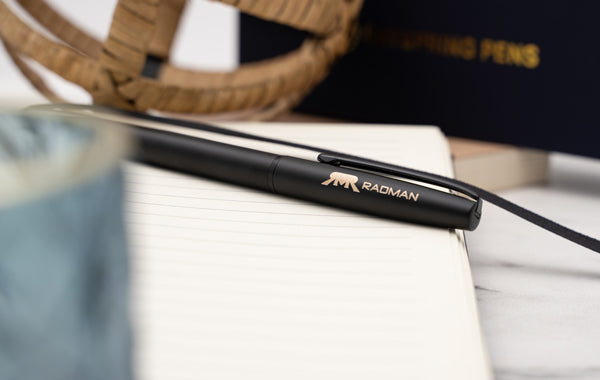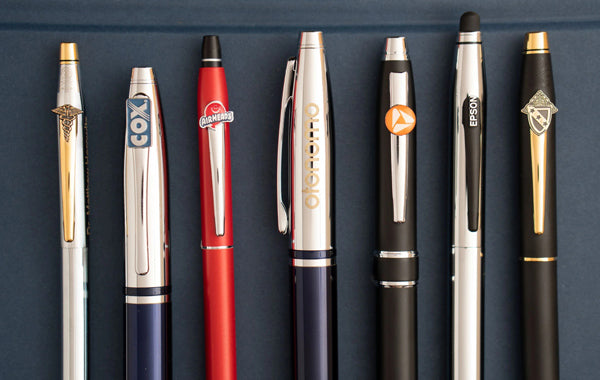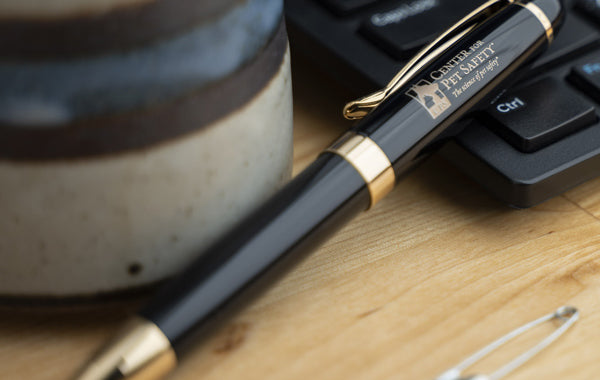The Ultimate Guide to Professional Gifting Etiquette

The Ultimate Guide to Professional Gifting Etiquette
So you want to use corporate gifts, but you:
- Are unsure about proper gifting etiquette
- Don't know which gifts will make the best impression
- Received a gift from another business and don't know what is expected from you
A lot of these situations require tact to avoid a breach in professionalism.
These are our tips and general rules for professional gifting, whether you are using professional gifting as a marketing tool to grow your business or as a way of communicating with clients and employee appreciation.
Here's a quick table of contents:
- Chapter 1: Rules For Business Gifting
- Chapter 2: Reasons to Use Promotional Gifts
- Chapter 3: How to Give a Corporate Gift
- Chapter 4: Rules for Receiving a Business Gift
- Chapter 5: Gifting In House
Chapter 1: Rules for Business Gifting
Let’s talk about all the must-knows about giving a gift as a business.
If you have ever had any of the following questions, here is where you will find your answers.
- Can I give a corporate gift to another business?
- Is it a bribe or a gift?
- What is considered a bribe in business?
Can I give a corporate gift to another business?
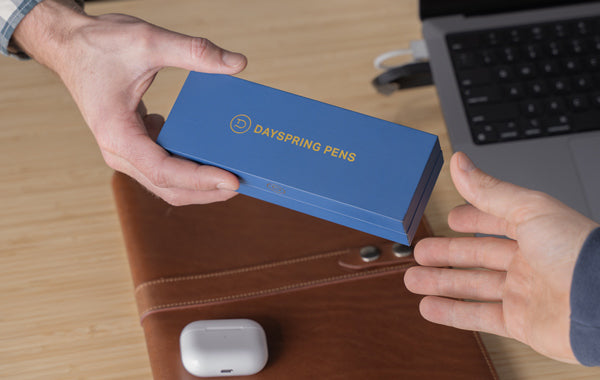
Yes, absolutely!
Corporate gifts are a great way to connect your brand to others and to grow brand recognition.
Business-to-business gifts usually consist of promotional merchandise connected to your brand.
Think your gift is being perceived as an attempt to make a sale?
That is not really your problem to deal with. It's a completely normal part of business to exchange promotional gifts, and the initial gift exchange is often understood to be just a plain old show of goodwill.
Gifting is a form of marketing, which means yes, ultimately you are trying to make a sale. The distinction is that in a business gift, there is no expectation of a return.
You do not make a sale because of a gift. The gift is just a way to show who you are as a business and demonstrate your brand.
So feel free to give, but do it with the proper etiquette.
Is it a bribe or a gift?
If you're wondering whether you're accidentally (or intentionally) bribing another business with your "promotional gifts", here's how to tell the difference.
What is considered a bribe in business?
A bribe is an exchange performed with the expectation that someone will return certain goods or services in one's own favor.
Bribes can range in severity: there are little bribes like slipping a hostess a $20 to bump up in the queue for a table, and then there are the big illegal bribes like sending an expensive gift or money to a public servant in order to gain special preference or treatment.
A gift, on the other hand, comes with no expectation of return. It is given freely.
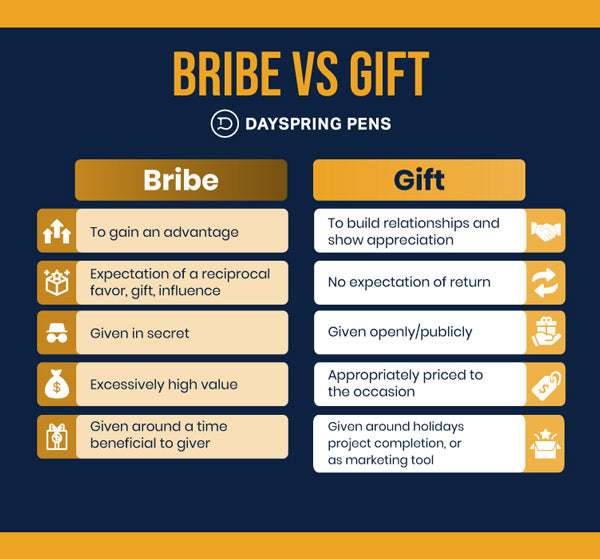
To avoid the perception of a bribe, remember to ask for nothing in return.
If you're using promotional gifts to grow your brand, send your merchandise to the other business and include a note about who you are and what your brand is.
This also means being careful of who you gift to. Do not pick favorites.
It is perfectly fine to send something small to a specific contact in a business, but as a general rule give a general gift (that is something to/for everyone).
Chapter 2: Reasons to Use Promotional Gifts
Now that we have discussed what not to do, let’s talk about why it is important to use Promotional Gifting.
You’ll find:
Why is it good to give promotional gifts?
First and foremost, giving a promotional gift is a form of marketing and should be used as such.
Promotional gifts exist to promote your brand and keep your brand tangibly visible to potential clients.
This means gifts with which someone physically interacts and has a pleasant experience with.
Learn More: Here is a study done by the Advertising Specialty Group on impressions made by promotional gifts.
What are the benefits of promotional gifts?
The long-term benefits of giving promotional gifts to both other businesses and clients are that they inevitably grow your brand recognition and establish trust.
The more people who see and recognize your brand, the more likely you are to generate business.
The more people engage with a gift, the more likely they are to think favorably about your business.
Read this article on the benefits of gift-giving between businesses to explore the full and practical potential of promotional merchandise.
Chapter 3: How to Give a Corporate Gift
So how do you actually gift? This chapter will discuss:
- Should I establish contact first?
- What are the best items for promotional gifts?
- How should I present business gifts?
- When should I give corporate gifts?
- Should I expect a response?
- Should I repeat gift giving?
- What are good business gift ideas?
What is good business gifting etiquette?
Good gifting etiquette starts and ends with professionalism. No gift should be too personal. The gift and the process of giving should always be related to the businesses.
When in doubt, formal is better than casual.
Should I establish contact first?
It's acceptable to send a promotional gift to someone or some business with whom you've not previously had contact.
However, be sure to leave a note of introduction that clearly explains who you are and why you sent the gift.
That said, sometimes it is better to establish contact first either personally or through one of the many forms of electronic communication available to you.
Establishing contact first can show that you're not trying to just annoy them with merchandise.
What are the best items for promotional gifts?
The best promotional gifts are generally practical and of good quality. They show that you know the brand to whom you are gifting while still staying connected to your own brand.
The Spruce has a great shortlist of appropriate and fun business gifts baskets, but you should also spend time researching different possibilities and even try to strategize some unique, previously untried ideas.
The type of corporate gifts you give should be catered to their interests. Your branded merchandise is great so long as it's not simply a box full of novelties with your logo on them. Stuff like that probably isn't all that related to the work either you or your recipient is doing.
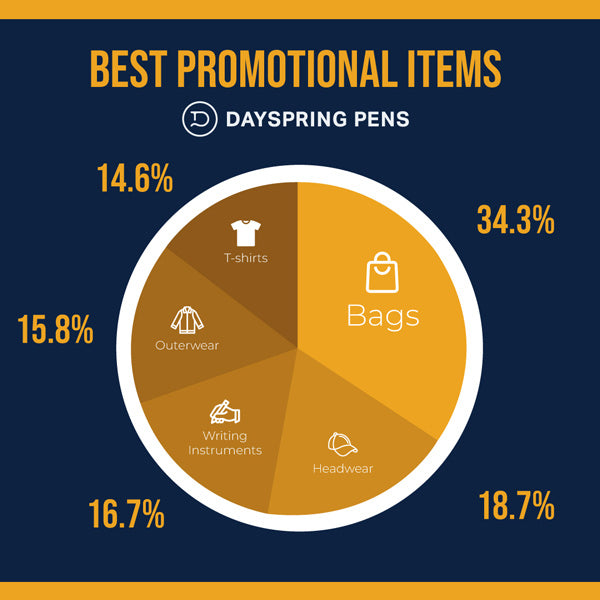
Try to think of what the other person will like and give them a corporate gift that's either practical, symbolic, or at least offers value. It's got to show your appreciation of them.
It shouldn't just be a "taster" of your own interests and services.
Do your research and get to know the business to whom you want to send a gift.
How should I present business gifts?
Business gift giving is an opportunity to communicate more than just what you do but how you do it, and it's not just the business gift itself that communicates that.
Spend some time on presentation.
Go the extra mile and get custom packaging made to the proportions of your gifts. Present your promotional gift in the way you yourself would want to receive it.

Show an attention to detail in a way that communicates the culture and care of your workplace.
So much of the effectiveness of corporate gift giving is in the details around the business gifts, and that's what's really going to communicate the quality of your work at first glance.
When should I give corporate gifts?
Gifting around the holiday season is the most common and acceptable time to give a business gift.
Other national holidays are great times to give too, especially if your brand can develop relevant thematic connections to it.
Another time to give is when a business reaches a major achievement (for example, perhaps its sales are way up to reach a sales goal) or receives a major award or recognition in a major publication.
These are all reasons to celebrate someone else's success and therefore reason enough for giving a gift.
If you are gifting in between holidays or simply not on a notable occasion, it's best to include a note explaining why you are sending a gift in the first place.
Should I expect a response?
If you get a response, then great! Just don't always count on it.
When you give gifts, oftentimes other businesses won't respond because they might not know whether they should or they might feel that to respond would be to initiate a conversation about your services that they are not ready to have.
Remember, the point of the gift is to familiarize them with your brand so when they are ready they know where to go.
Should I repeat gift giving?
It's okay to give more than one gift, and it's generally alright to give multiple times over an extended period.
However, don't just give gift after gift until you get a response or pester the other business into buying from you. Don't drown your potential client in merchandise and send the wrong message.
A good rule of thumb is if you give a business gift, and the other business or client gives a return gift or sends a note of gratitude, then you can safely give another gift after a while.
What are good business gift ideas?
You can find a ton of great gifting ideas on the internet.
Business Insider's list of corporate gifts is a great place to start. There's also my list of 103 personalized gifts; many of the items on that list can make great branded merchandise.
In the following table I summarize different types of corporate gifts and the occasions most suitable for them:
| Gift Type | Appropriate Occasions | Recommended Gifts |
| Client outreach | Anytime of year | Branded merchandise, practical items like pens, umbrellas, notepads |
| Client thank-you | Closing a deal, project completion | Customized gifts, padfolios, premium pens |
| Employee recognition | Employee leaving, promotion | Engraved pens, gift cards, professional accessories |
| Business partner appreciation | Successful collaboration, milestone | Executive gifts, branded merchandise |
Chapter 4: Rules for Receiving Business Gifts
It is time to discuss being on the opposite side of the gift giving cycle. We will be talking about:
- Is it ethical to accept gifts from another business?
- Is it better to give or to receive?
- What is good business for receiving a business gift?
Is it ethical to accept gifts from another business?
It's absolutely alright and ethical to accept business gifts from others.
You can get excited when another brand sends you a gift. Take time to go through everything they send you so that you don't miss potential opportunities to grow your brand by building a relationship with outside business partners.
And it's good gifting etiquette to send at least a thank you letter back.
Is it better to give or to receive?
As far as business practices go, it's better to give because that helps grow your brand recognition.
However, if you receive a gift, don't think of it as an opportunity for the giver alone to grow their brand. A response of gratitude can also be an opportunity for the recipient to promote their business in return.
Related Reading: 4 Reasons Why Corporate Gifting is Crucial to Growth
What is good etiquette for receiving a business gift?
At the very least, send an email thanking the giver and showing gratitude for their act of gratuitous kindness. Add a note of personal appreciation for the value of their work and how you think your brands might be related in content, and leave it at that.
If you want to go above and beyond, send a small return gift with some goodies and your own branded items.
This might seem a bit strange, but when you receive their gift, have some of your employees look at their branding and appraise the value of their brand.
The decisions for continuing business-to-business are up to you, but getting your employees' input can offer a bit of detached appraisal, helping you to make wise decisions about how you could respond to their gift and strengthen professional ties.
Plus, if anything, your employees will feel like they have more stake in the day-to-day decisions that happen around gift giving.
Chapter 5: Gifting In House
Can employees accept gifts?
Absolutely, bosses and managers can give gifts to their employees. The holiday season is also a great time to give gifts to the people in your own office.
But you should still be careful about professionalism in workplace gift giving and check in with your company’s HR department to make sure you follow any company rules on gifting.
What’s a good gift for an employee?
Be aware that the type of gift that you give is very important. Don't give anything that's too personal.
You don't want your other employees to think that you're showing favoritism. You have to maintain a healthy and professional culture of gift giving among the employees on your team so that no discontent arises out of shows of appreciation, value, and gratitude.
Set clear policies for gift giving that everyone can easily remember and follow.
Opt for a functional gift that applies to the workplace. A small gift card also makes a perfect gift.
Can I give gifts to my boss?
It's completely fine to get a gift for your boss, but you'll need to be extra careful.
It's not professional to appear to be currying your boss's favor with a gift.
And it's usually only appropriate to give gifts on special occasions like the holiday season or a birthday.
A great way to avoid a breach in professionalism is to opt for a group gift. Group gifts disperse the personal aspect of the gift across multiple people, and they include those people so it doesn't look like it's just one person trying to get ahead by taboo means.
Follow the policies that your office has in place for healthy business gift giving.
I've written a few other articles on healthy gift giving culture in the workplace and giving gifts to coworkers that go more in-depth on tips for office gifting.
Conclusion
These have been our tips, rules, and general bits of advice for proper business gifting etiquette to guide you through the possibilities and benefits of corporate gifts for growing your brand recognition.
If you follow this advice, you're bound to add new value to your work and increase the potential for a business relationship to maximize profits and output.
|
Sam Di Nardo is an author for Dayspring Pens, where she has honed her expertise in ballpoint, rollerball, gel and fountain pens since joining the team in 2018. From her initial role as an Engraver to becoming the Production Manager, Sam's journey has been marked by her passion for the history, manufacturing, and the unique value of gifted writing instruments. A graduate of Regent University with a degree in English Literature and a special interest in Old Norse literature, dive deeper into Sam's world and discover why she's your trusted guide in the realm of gift pens. |
